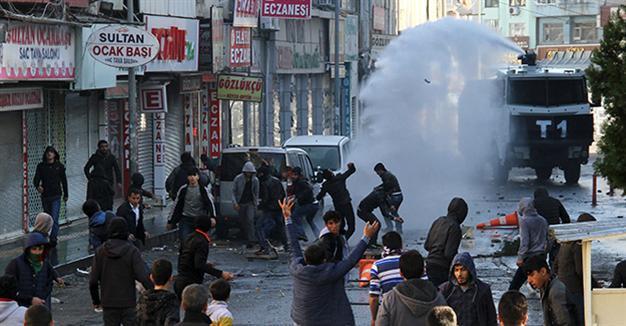Turkey’s top court refuses HDP MP’s appeal against curfews in east, southeast
ANKARA

Riot police use a water cannon to disperse demonstrators during a protest against the curfew in Sur district, in the southeastern city of Diyarbakır, Turkey, December 22, 2015. REUTERS/Sertaç Kayar
Turkey’s top court has refused an appeal by a member of parliament against the ongoing declaration of curfews in the country’s eastern and southeastern regions, suggesting the lawmaker hasn’t been personally affected by this practice.Peoples’ Democratic Party (HDP) Adana deputy Meral Danış Beştaş, who is also a deputy co-chair of the party, filed an individual complaint to the Constitutional Court on Dec. 21 and the court delivered an interim decision on the appeal late on Dec. 22.
Having argued that fundamental rights of citizens, with the right to life, health and education being in the first place, have been violated by curfews imposed in certain provinces and districts, Beştaş filed an individual application to the Constitutional Court. Beştaş based her application against curfews on quia timet - injunctions ordered by courts in order to restrain the occurrence of an actionable wrong by a defendant in circumstances where the claimant’s legal rights are threatened by the defendant or where the defendant seeks avoiding the repetition of unlawful conduct.
Yet, the court concluded that any application could only be reviewed in relation with claims involving the applicant itself. The court didn’t come to a conclusion proving that the applicant, who resides in the capital city of Ankara, has been personally affected by curfew decisions or victimized due to curfew practices. Thus, the court saw “no reason” for quia timet because information in the file was “not sufficient at this stage to display that there is a serious danger against the applicant” and decided to refuse the application.
Turkish security forces have imposed curfews in many districts across Turkey’s east and southeast in recent months, stating that they are trying to prevent civilian casualties during clashes with militants of the outlawed Kurdistan Workers’ Party (PKK).
Areas under curfew have also seen intense clashes that have caused severe damage to homes, shops, mosques and several other buildings, prompting many locals to flee during breaks in curfews.
A report by the Human Rights Watch released on Dec. 22 urged Turkish authorities to scale back security operations in the country’s southeast, warning of rapidly rising casualties among civilians. The group documented 15 civilian deaths during 24-hour curfews in September and November, noting that these were just a “sample” and called for a full investigation. It cited a local rights group who put the civilian death toll since July at over 100.
Periodic clashes have erupted between government forces and PKK militants since peace talks collapsed in July. Provincial authorities have slapped extended curfews on flashpoint neighborhoods and towns in the south, a measure they see as necessary to facilitate security operations. The curfews have often been coupled with electricity and power cuts. Many residents have been displaced as a result of the fighting while wounded people have been denied medical attention, according to the report.
















